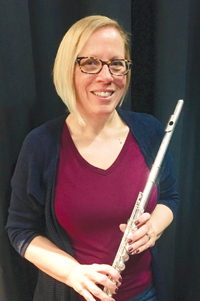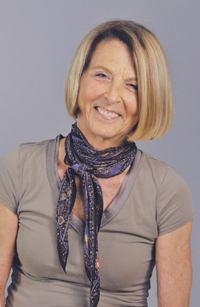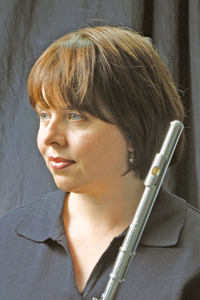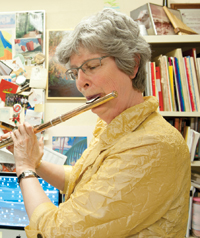
As the school year draws to a close, several veteran teachers share the advice they give to graduating students to prepare them for college, graduate school, or a professional career.
Leone Buyse
.jpg) Preparing to leave school and enter the professional world is a significant moment that often causes masters and doctoral students a great deal of stress. When advising students who are about to graduate, I suggest that the most effective way to reduce anxiety about a future in the music profession is to stay flexible about career goals while honing entrepreneurial skills.
Preparing to leave school and enter the professional world is a significant moment that often causes masters and doctoral students a great deal of stress. When advising students who are about to graduate, I suggest that the most effective way to reduce anxiety about a future in the music profession is to stay flexible about career goals while honing entrepreneurial skills.
Very few graduate students are fortunate enough to win a full-time orchestral or college teaching position immediately upon graduation. Many highly successful musicians have developed freelance careers that combine playing and teaching with jobs in such related fields as orchestra administration, recording technology, instrument repair, church music, and music therapy. For that reason, having a strategy for building your visibility and professional résumé after receiving an advanced degree is essential. The following practical suggestions have proved to form a highly effective course of action for many students after their graduation.
If you are interested in orchestral playing, send your résumé to contractors in the city where you are living. Be sure that you list references that include contact information after first obtaining permission to do so. If you have studied with someone who currently holds an orchestral position, ask that person to look over your materials to assure that they present your achievements in the most professional light possible. In a cover letter, provide links to where your playing may be heard online and also offer to audition in person. Explain that you are building a freelance career and would greatly appreciate being considered for any jobs that might arise.
Stay alert and connect with the professional music community in your area to find out if orchestras nearby may be holding auditions for their sub list. Record standard excerpts and keep those on your computer, updating your catalog regularly. Samples of your best playing should be easily accessible if you are asked to submit a preliminary recording for a professional audition.
Form a chamber ensemble and begin seeking opportunities to perform in hotels and restaurants, or at weddings, bar mitzvahs, and other social occasions. Flute and guitar or flute and harp are popular combinations, but other instrumental pairings can be equally attractive and marketable. The key to a successful career in chamber music is to choose partners whom you enjoy as both musicians and people, and whose working style and vision for the group closely align with yours. At first you might have to give a few free performances to become known in your community, but those appearances can be viewed as an investment in a future career. Have business cards available wherever you play and develop an appealing, professional website.
Identify and capitalize on your strengths. Hilary Abigana is an excellent example of a flutist who has done exactly that. After earning her M.M. degree, she played with the Evansville Philharmonic and the “music-telling” group Tales and Scales before co-founding The Fourth Wall with a trombonist and a percussionist. A highly trained dancer, Hilary incorporates her dance background onstage in remarkable ways throughout her hybrid arts ensemble’s interdisciplinary shows.
Another stellar example of thinking outside the box is WindSync, an adventurous woodwind quintet of which flutist Garrett Hudson is a founding member. Like The Fourth Wall, the group plays exclusively from memory, presents original arrangements of classical and popular music, and uses staging and dance elements in all presentations. The members of both ensembles possess high-energy, outgoing personalities and engage easily with audiences.
If college teaching is a career goal, earning a doctorate is now essential. Acquiring teaching experience throughout masters and doctoral studies and beyond is extremely wise, so work to build a studio by word of mouth and by contacting local band directors. Polish your writing skills. Working in an academic environment requires the ability to express thoughts clearly in writing and also to mentor students who lack that all-important skill. Writing well is vital when composing cover letters for job or grant applications or when contacting contractors or others who might be able to help you.
If you are nearing the completion of your doctorate and beginning to apply for positions, ask professors at your school to stage a mock interview so that you will be more aware of possible questions that might be asked and can practice responding to them. In addition, perform in your community at hospitals, senior citizen centers, homeless shelters, and other venues. This will add a welcome new dimension to your dossier.
No matter what your career goals, stay connected with people from your school. Continue to build your network and above all be a good colleague. Supporting others shows that you have confidence in yourself and are not afraid to recognize others’ talents. When you work as a freelancer and cannot accept a job, recommend qualified colleagues. This is a real favor to them and will make them more inclined to recommend you in a similar circumstance.
Stay in touch with your former mentors and keep them updated on your career. They may be able to help you if they know what you are currently doing or if you are seeking a change.
When concerns about earning a living arise, remember why you are a musician and what drew you to music as a career path. Continue to grow as a musician by listening to inspiring artists and music that you do not know. Seek to grow as a person by pursuing other areas of interest on a regular basis. Fashion a daily life that includes time for friends, exercise, proper nutrition, and adequate rest. You are an athlete and should treat yourself as such.
Lastly, read and try to live by The Four Agreements by Don Miguel Ruiz: Be impeccable with your word. Don’t take anything personally. Don’t make assumptions. Always do your best. These axioms are powerful guidelines that will serve you well in all situations. As a result, others will always consider you a trusted, deeply valued professional colleague.
Leone Buyse is the Mullen Professor of Flute at Rice University. Formerly a principal flutist of the Boston Symphony and Boston Pops, and a member of the San Francisco Symphony and Rochester Philharmonic, she has performed with the Juilliard, Tokyo, Brentano, and Muir Quartets, Boston Musica Viva, Da Camera of Houston, and at such festivals as Sarasota, Aspen, Music Academy of the West, and Norfolk. She has presented recitals and master classes throughout the U.S. and in Canada, Europe, Japan, Australia, New Zealand, Mexico, and in Central and South America. In 2010 Buyse received the National Flute Association’s Lifetime Achievement Award in recognition of outstanding contributions to the flute community worldwide.
Leonard Garrison
.jpg) The last lessons are a unique time to engage in discussion. Suddenly, all the pressure is off: senior recitals, graduate auditions, and competitions are done, and in the Lionel Hampton School of Music, we do not require a jury after the senior recital. This presents an opportunity to discuss the future.
The last lessons are a unique time to engage in discussion. Suddenly, all the pressure is off: senior recitals, graduate auditions, and competitions are done, and in the Lionel Hampton School of Music, we do not require a jury after the senior recital. This presents an opportunity to discuss the future.
I tell students that whatever they do, they should always keep music and the flute in their lives. They have invested much energy, time, and passion in music to this point, but many will not pursue a musical career. Practicing, playing as a soloist or in an ensemble, and attending concerts are rewarding lifelong pursuits, even for doctors, lawyers, and engineers.
We have not covered everything, so keep learning. It is impossible to learn all the flute repertoire in a lifetime, let alone four years in college. I keep discovering previously hidden gems and maintain a bucket list of new pieces I would like to perform. Don’t shy away from challenges. We are all happier when we stretch ourselves. Learn a new aspect of flute playing: piccolo, low flutes, extended techniques, Baroque flute, jazz flute, or world flutes. I also remind them to keep an open mind. When moving from one teacher to another, students should be flexible and consider new ideas. I regret being headstrong in my foolish early years. My undergraduate teacher, Robert Willoughby, was a god to me, and I considered everything he taught me as doctrine. Initially, when my next teacher Samuel Baron offered a suggestion in contradiction to what I had previously learned, I rejected it. Soon I realized my folly and resolved to take to heart every idea that any teacher presented. I would sort out the contradictions later.
Be your own teacher. At some point, each of us becomes self-taught. In fact, this is a process I encourage in students by giving them the tools to become independent and make their own educated decisions. Keep in shape with warmups and technical studies. Develop the ability to analyze your own playing – recording yourself is the best tool. Attend flute performances and listen to recordings with a critical ear. Rather than imitating a performance, develop your own interpretation based on the interpretive principles established in lessons.
Be resilient. For most of us, life presents more failures than successes, but we bounce back. For every competition, orchestral audition, grant application, or college teaching opening, there are more losers than winners, but the most successful people learn from failures, thus contributing to future success. As David Burge wrote in Flute Talk (“College Music Programs: Progress Without Purpose,” March 1993), educational environments are nurturing, but the real world can be cruel. Each of us must have faith in our own abilities and rely on our love of music.
Find your unique voice and make original contributions to the musical world, even though not everybody can release the definitive recording of the Poulenc Sonata. It takes some time and research to develop a specialty: consider Greg Pattillo (beatboxing), Adrianne Greenbaum (Klezmer flute), or Chris Potter (low flutes).
Create your own opportunities. Sam Baron told me he regretted there were not more paid performing opportunities for my generation. He told stories about a plethora of freelance gigs in the 1940s, when orchestras were everywhere – in Broadway theaters, in studios recording jingles for radio, in big cities, suburbs, and small towns. Things have gotten even worse since my formative years, and full-time jobs playing in symphony orchestras or teaching at the college level are increasingly rare. However, today’s flutists are amazingly entrepreneurial. They are forging careers that combine diverse experiences (working a day job, playing in a salsa band and symphony orchestra, and teaching) and forming innovative new performing groups, reaching new audiences, and finding new sources of funding.
Keep in touch. I encourage my students to communicate regularly and am heartened when former students ask questions, tell me about what they are doing, or express gratitude – several students have said that only years later did they understand the value of my teaching. It is important to realize that teachers are a gateway to the professional world, who can write letters of recommendation, introduce students to famous colleagues, and serve as a model for professional life.
Leonard Garrison is Professor of Flute and Associate Director of the Lionel Hampton School of Music at The University of Idaho, flutist in the Scott/Garrison Duo, principal flutist in the Walla Walla Symphony, and former President of the National Flute Association. He teaches and performs at Blue Lake Fine Arts Camp in Michigan and the Red Lodge Music Festival in Montana. Winner of the 2003 Byron Hester Competition, he has performed in the Chicago Symphony, the Tulsa Philharmonic, and on National Public Radio’s Performance Today. He has taught at The University of Tulsa, Bowling Green State University, the University of Arkansas, and the University of Wisconsin at Eau Claire. Flute Talk and The Flutist Quarterly have published his articles. He has released nine CDs on major labels.
Sandy Olson
 The advice I give begins not when students leave my studio but when they enter it. Most of it is wisdom that was passed on to me by my teachers and mentors.
The advice I give begins not when students leave my studio but when they enter it. Most of it is wisdom that was passed on to me by my teachers and mentors.
Work hard. Don’t get by on good enough. Work your hardest at whatever you do.
Don’t accept less than your best. Only you know what is your best. Don’t accept less.
Don’t give up when things get hard. Work through your problems. Persevere.
Take chances. The worst thing that can happen is that you fail. Some of the greatest successes have come from previous failures.
Try not to say always or never. There will undoubtedly be exceptions.
Learn all you can about everything you can. Never stop learning. Stay curious. Ask questions. Listen carefully. Watch closely.
Sometimes you will win. Celebrate your accomplishments.
Sometimes you will lose. Pick yourself up after you lose, figure out how to do it better, and put yourself back out there again.
Hang on to people who lift you up. These are the people who want to see you succeed. They believe in you.
Let go of the people who tear you down. These are the people who look for the negatives in life. They only see problems instead of possibilities.
Don’t give up on things that are important. You will have to decide what is important.
Let go of things that are not important. Again, you will have to decide what is not important. It does not mean you cannot have hobbies, fun, and relaxation. Those things definitely serve a purpose.
If something needs to be done, just do it. Don’t wait – and don’t believe people when they say their best work was done at the last minute. It is most likely not true.
It is okay to change direction. You will be making decisions for the rest of your life. Hopefully, you will make more good decisions than bad ones. Don’t be afraid to change directions midstream if things are not what you expected.
Character matters. Stand up for what is right. Apologize when you are wrong. Be trustworthy. Be reliable. Be kind to others. Help those in need. Who you are is much more important than what you do.
I have changed directions many times in my life. I am confident that I have made more good decisions than bad ones. When I was starting out and newly married, I was unsure about which auditions to take and which jobs to apply for. My husband gave me great advice: “You can’t turn down a job you don’t apply for.” The other life advice I follow, I actually learned from watching Maria Shriver being interviewed by Barbara Walters. She said that you can be the best at everything; just not all at the same time. Whatever your path in life, remember to give yourself permission to prioritize and put some things on the back burner until you are ready to give them your all. There are times when we all need to turn to our trusted teachers, mentors, friends, and spouses for advice. By the time students leave my studio, I hope they are confident, independent adults ready to pursue their dreams.
A native of Naperville, Illinois, Sandy Olson has been a flute teacher and director of the summer flute camp at Westminster Conservatory in Princeton, New Jersey as well as a middle school music teacher in South Brunswick, New Jersey for the past 20 years. In addition, she runs the flute ensemble for YOCJ, the Youth Orch. of Central New Jersey. For the National Flute Association, Sandy is a past chairman of both the High School Soloist Competition and the High School Flute Choir Competition.
Anne Reynolds
 I tell students that I am so proud of what they have accomplished in their time with me. They have improved in technique, control, sound, style, and embouchure. They have given a recital or two and have participated in chamber music. They have taught some younger students and as a result have experience with this as a way of making a living. Now all they have to do is go out and figure out how to be a flute player or teacher.
I tell students that I am so proud of what they have accomplished in their time with me. They have improved in technique, control, sound, style, and embouchure. They have given a recital or two and have participated in chamber music. They have taught some younger students and as a result have experience with this as a way of making a living. Now all they have to do is go out and figure out how to be a flute player or teacher.
But wait, maybe that is not all. The biggest challenge I think that they will face is how to integrate flute and teaching into a bigger life outside. Here in school, flute is their whole life, so it is all imaginable. When they get out in the real world, whatever that means, there are new considerations that they have not had to include in their calculations. Where are they going to live? How are they going make money? Do they need to buy a car? Do they want to work for a while and then go back for some more school? What about that person they care about who is moving to China, Belize, or South Dakota? Is it going to be easy to practice if there is not a lesson or concert to practice for?
This is really only a partial list and does not even include things such as student debt. All of these elements are daunting, so a carefully considered approach is important. The biggest one is this: what is your overall long-term goal? If it is to play in an orchestra, you have a hard row to hoe, but it can be done. The people who achieve it are spectacularly well organized (for the most part) in their approach to this career.
For students who are pursuing a job in another field but want to keep playing, it will take some work. Once you land in a community, you will have to rustle around and find out what kind of amateur playing is available. They are not going to come and find you. The amateur world can actually be quite competitive with folks guarding their positions. You will have to convince them that they need you to make a better ensemble.
Having a plan does not mean that things will go the way you have in mind, so your outlook should be open and flexible. If someone asks you to play somewhere and it is not convenient, do it anyway. The opportunities that come from happenstance are not to be missed, and you have to be ready.
I think the most important thought I can leave students with is this: If you love to play, then play. Keep at it. Enjoy what you can. Be grateful that you have this ability and can pursue it. Try to be friendly to all of your competition. You never know when a good deed to a colleague or peer will come back as a gift. Try to find folks in your circle who will join you in an evening of chamber music for fun, and go to concerts. You have the ear to appreciate good playing, and there will be people playing good concerts. It all keeps moving along, and you can move along with it.
Anne Reynolds studied flute with William Kincaid and performed as a soloist with the Philadelphia Orch-estra while still in high school. A graduate of the Indiana University School of Music as a student of James Pellerite, she was a member of the Indianapolis Sym-phony Orchestra from 1968 to 1978. She is a charter member and principal flute of the Indianapolis Chamber Orchestra. She is a faculty member of DePauw University where she is a member of the DePauw Woodwind Ensemble, as well as the University of Indianapolis where she regularly performs on the faculty artist series. She is also a solo recitalist and freelance musician in Indianapolis, playing recordings and occasional jobs. She writes music reviews for Flute Talk and is the ensemble chair of the Indyflute group, a gathering of flutists in the Indianapolis and Indiana area. She also tests flutes and headjoints for the noted flute maker David Straubinger.
Sandra Saathoff
 The final lesson is poignant and bittersweet. Yet I believe graduation to be a true commencement, or a beginning. Even though I miss my students once they leave my studio, I am even more excited to see them launch into the next phase of their lives. They also know that they are always welcome to visit, to ask questions, to take a lesson here or there, or even to participate in alumni events. I have Facebook groups for students and SPU alumni, which they can be a member of and keep updated with flute-related news. The door is always open, and I do hope they stay in touch.
The final lesson is poignant and bittersweet. Yet I believe graduation to be a true commencement, or a beginning. Even though I miss my students once they leave my studio, I am even more excited to see them launch into the next phase of their lives. They also know that they are always welcome to visit, to ask questions, to take a lesson here or there, or even to participate in alumni events. I have Facebook groups for students and SPU alumni, which they can be a member of and keep updated with flute-related news. The door is always open, and I do hope they stay in touch.
However, the advice I give to students over their last few lessons is entirely dependent on the student. If they are moving on to a new school and will study music, I make sure they are prepared with the necessary audition advice and materials. If they are moving on to a new school but will not pursue music as a degree, I want them to know who to contact in the area, or at the school, to find out ways they can still remain active in making music. I also remind them about the larger flute world – local and national flute organizations they can join and keep themselves involved. In any case, we focus on the future, ensuring that all the great skills they have gained will get a chance to continue to be shared in music-making with others.
Of course, some time is also spent reflecting over all they have accomplished. As we reminisce over their first lessons, struggles that were conquered, or particular memorable events, I am always amazed by the depth of their progress and maturity, and I hope they are as well.
Students graduating with a music degree compile a notebook of materials that I and others have given them over their years of study. In their final semester, we review these handouts, which include guidelines for setting up a private studio, repertoire suggestions based on student needs, and other pedagogical materials. Now that the reality of entering the workplace is upon them, many questions arise, and we discuss various strategies for beginning their careers and achieving their goals. Usually it is at this time one of my favorite pieces of advice reemerges – always act like the professional you wish to be viewed as – including being prompt, positive, and organized.
Throughout a student’s time in our studio, I focus on teaching them to be their own best teacher. As they approach graduation, I begin to see a natural shift in their perspective: instead of thinking “How does this piece of information help me personally?” they begin to ask “How will it help my future students?” Typically, this has led to some thoughtful discussions about the reasoning behind pedagogical choices, and hopefully they gain some advice for working with their own students.
Last lessons are also a great time to go over something we may have missed or that has been on their wish list – a particular piece, orchestral excerpts for piccolo, extended techniques, beatboxing, Baroque traverso, or Irish flute. There is always something new to explore, but, for the most part, the final lesson is student-directed and always includes duets.
My general words of wisdom are fairly basic. Play, play, play! Practice. Stay prepared for any opportunity that might come your way. Create performance opportunities for yourself (and others). Find others to make chamber music with, or join a large ensemble.
Continue to learn. Take lessons, go to workshops and camps, and attend a variety of concerts. Support your colleagues and keep abreast of the local music scene; join the National Flute Association and subscribe to Flute Talk. Use YouTube and other online resources to stay engaged. Develop entrepreneurial and business skills.
Sandra Saathoff teaches at Seattle Pacific University and conducts Bellevue Youth Symphony’s flute ensemble. A freelance flutist, clinician, and principal flute of Seattle Philhar-monic, she helped launch a nonprofit organization, Silver Flight Ensembles and Foundation, dedicated to helping student flutists in 2016. A published author and music arranger, she has also performed and taught throughout the United States and Europe. Sandra has served as Assistant Program Chair, Secretary, Convention Manager, and on the Long-Range Strategic Planning Committee for the National Flute Association, and has been President, VP, and Newsletter Editor for the Seattle Flute Society. Her teachers include Zart Dombourian-Eby, Rae Terpenning, Baroque flute with Kim Pineda, and Irish Flute with Leo Mac Namara and Conal O’Grada (Ireland). She is currently pursuing doctoral studies at the University of Nebraska-Lincoln with Dr. John Bailey. sandrasaathoff.com
Katherine Borst Jones
 The last lesson while bittersweet, is always a celebration, a time to reflect on the accomplishments of the student as well as help him or her dream for the future. No matter the level, sharing insights into accomplishments is important for students to recognize what they have learned and think towards the future. The combination of confidence, discipline, and initiative is discussed in relation to what comes next.
The last lesson while bittersweet, is always a celebration, a time to reflect on the accomplishments of the student as well as help him or her dream for the future. No matter the level, sharing insights into accomplishments is important for students to recognize what they have learned and think towards the future. The combination of confidence, discipline, and initiative is discussed in relation to what comes next.
Teachers strive to teach students to teach themselves, and the last lesson is a time to review those ideas. It is also a place to stress that the student’s next experience will be different, and that this is a good thing. I remind students that an open mind is essential to growth. I also let them know that it is okay for them to go on, with my blessing, to the next teacher where they will continue to flourish and learn. I believe that providing encouraging information about the next step is essential to their future success.
Remind students of the many challenges they have faced and how they succeeded. That Jolivet piece was difficult, but with perseverance, excellent practice techniques, and desire, they overcame the difficulties. Discuss the importance of professional behavior with a new teacher and how essential it is to not take offense at criticism. I share that while they may have reached a pinnacle at their current school level, in their next environment they will be challenged to rise to that level again.
In early lessons, students answer a list of questions about their aspirations and goals. At the last lesson, it is worthwhile to revisit this list to review results. Answering the same questions is a worthy exercise. “How passionate are you about music?” “How hard are you willing to work?” “What is your goal for next year, the next level?”
Asking them to share highlights of past lessons can be enlightening for teacher and students. As a teacher, I am always looking to be better. By asking students these questions, you let them know that their opinions matter while helping them to understand what it means to teach.
The last lesson is also a time to reaffirm such ideas, such as for a graduating music education student, the importance of finding performance outlets even as they teach. Find that community band, orchestra, or flute choir to enlarge their musical experience. Form a chamber group to play at an art gallery. Find a duet partner. If they are going on to college but not as a flute major, reaffirm performance and lesson possibilities at their chosen institution.
It is important to let students know that you will continue to respect and honor them as people, as musicians. I remind them that I hope they will stay in touch and that I am there for them in good and bad times. Not only do I want to hear about their future successes, but if they are having a difficult time, I am willing to provide an ear for listening.
A great last moment is to play a duet together. Making music has always been the goal.
Katherine Borst Jones is professor of flute at The Ohio State University, winner of both Distinguished Teacher and Distinguished Scholar Awards, the founder of the OSU High School Flute Workshop and the OSU Flute Troupe. She is a founding member and co-principal flutist (The Miriam and Bernard Yenkin Chair) of the ProMusica Chamber Orchestra, the trio, COSMOS, a member of the Columbus Symphony Orchestra and principal flute of the New Sousa Band which has toured Japan, China and the United States. She has served the National Flute Association as President twice and was the 1992 Convention Program Chair.
Additional advice will be included in the May/June issue. What advice do you send students off with? Share your thoughts by emailing editor@flutetalkmagazine.com





